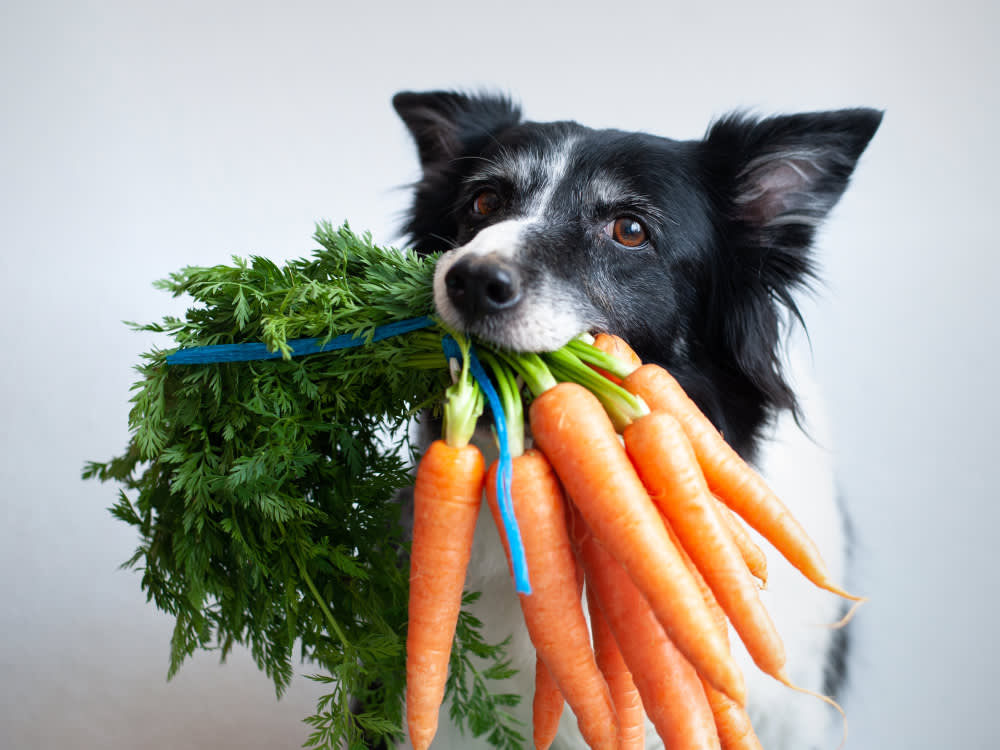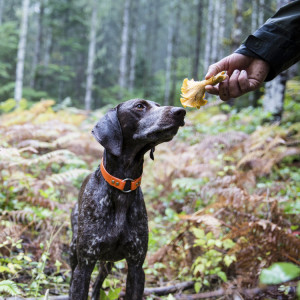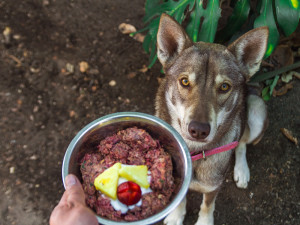How to Get Your Dog the Vitamins and Minerals They Need
Your pup needs their greens, too.

share article

Your pet wants you to read our newsletter. (Then give them a treat.)
We humans are obsessed with the latest superfoods — and rightfully so. Some of those snacks pack a major punch, and in a world of preservatives and confusing marketingopens in a new tab, there’s no harm in wanting to stick to the classics. But what are the vitamin and mineral equivalents of turmeric for dogs? Because we for sure want to be feeding them to our pups.
“Functional superfoods [have] the most beneficial effects on health,” Dr. W. Jean Dodds says. “They reduce chronic inflammation and promote healing; are powerfully antioxidant, antimicrobial and antitumor; and are even believed to delay aging.” Serving your dog the vitamins and minerals in these essential canine functional superfoods will help your dog fight disease, boost energy, and maintain good health and weight opens in a new tabin general.
So, what vitamins do dogs need every day and what foods do they come from? For some pet parents, feeding dogs commercial food makes the most sense; it is not only convenient, but — if they select high-quality food made by companies with proven records of ingredient integrity — it provides their dogs with a generally wholesome dietopens in a new tab. But there are a lot of factors in commercial pet food to consider.
Below are vitamins and minerals your pup needs, plus how you can add them to your dog’s diet with superfoods.
Vitamins
Vitamin A
Carrotsopens in a new tab, spinach, liver, pumpkinopens in a new tab, sweet potatoesopens in a new tab, fish oilopens in a new tab, eggs, and turnip greens.
Vitamin D
Marine fish oil, fatty fish, egg yolks, dairy products, liver, beef, and cottage cheese.
Vitamin E
Plant oils, leafy green vegetablesopens in a new tab, seeds, wheat germ, bran, whole grains, and liver.
Vitamin K
Liver, leafy green vegetables, milk, cabbage, and fish.
Vitamin C
Fruits, vegetables, and organ meats.
Vitamin B
Whole grains, nutritional or brewers yeast, liver, beans, green vegetables, spirulina, nuts, and dairy products.
Macrominerals
Calcium
Milk, yogurt, tofu, sardines with bones, raw bones, bok choy, green beans, broccoli, and cauliflower.
Phosphorous
All animal tissues, eggs, fish, and milk.
Magnesium
Spinach, broccoli, green beans, tofu, tomato juice, beans, whole grains, and seafood.
Potassium, sodium and chloride
Fruits, vegetables, milk, and grain.
Microminerals
Zinc
Spinach, broccoli, yogurt, beef, poultry, whole grains, and vegetables.
Sulfur
All protein foods (meats, fish, poultry, eggs, legumes, and milk).
Iron
Red meats, fish, poultry, shellfish, eggs, and legumes.
Iodine
Iodized salt, seafood, dairy products, and kelp.
Selenium
Seafood, meat, whole grains, brown rice, and vegetables.
Copper
Seafood, nuts, whole grains, seeds, and legumes.
Manganese
Nuts, whole grains, and leafy vegetables.
Chromium
Lean meat, vegetable oils, and brewers yeast.
Cobalt
Liver, kidney, fruit, and vegetables.
Fluorine
Water.
Molybdenum
Legumes, cereals, and organ meats.
Silicon
Cereals, vegetables, beans, and peas.

Claudia Kawczynska
Claudia Kawczynska was co-founder and editor-in-chief of The Bark for 20 years. She also edited the best-selling anthology Dog Is My Co-Pilot.
Related articles
![Husky wolf dog sitting waiting for her natural raw food]() opens in a new tab
opens in a new tabEverything You Need to Know About the Raw-Food Diet For Dogs
The feeding practice is popular — should you try it?
- opens in a new tab
What’s in a Cup?
A dog food measurement by any other name would be confusing.
![A woman smiling at her dog while carrying a bowl of food.]() opens in a new tab
opens in a new tabIs Yogurt Good For Your Dog?
Yep, dogs can eat yogurt — it’s safe and healthy, and most dogs love it.
![Man crouching down to let two dogs eat out of a bowl]() opens in a new tab
opens in a new tabHow Many Treats Is Too Many?
The key to curbing mindless snacking — this is for your dog.







